Written By: Dr. A.N. Grier
![Resumed - Alienations 01]() I was quite intrigued when I grabbed the promo for Resumed’s debut album Alienations for two reasons: they’re technical death metal and they’re Italian. However, when I hit the play button expecting to find some spaghetti-flavored Origin (or something equivalent), I instead found the other kind of tech death. You know, the kind linked to words like “jazz,” “fusion,” “funk,” and “virtuoso playing.” Admittedly, this style of technical death is not my favorite, but it turns out Resumed can shred virtuously. Not the best song writing in the world but the musicianship of each member is astounding. Let the wanking begin!
I was quite intrigued when I grabbed the promo for Resumed’s debut album Alienations for two reasons: they’re technical death metal and they’re Italian. However, when I hit the play button expecting to find some spaghetti-flavored Origin (or something equivalent), I instead found the other kind of tech death. You know, the kind linked to words like “jazz,” “fusion,” “funk,” and “virtuoso playing.” Admittedly, this style of technical death is not my favorite, but it turns out Resumed can shred virtuously. Not the best song writing in the world but the musicianship of each member is astounding. Let the wanking begin!
I have to say the first reference that came to mind as opening track “Dead Inside” powered forward was Symbolic and The Sound of Perseverance-era Death. The similarities tend to be in the realm of the heaviness, chords, and arrangements of Chuck’s last two albums. Other references come in the form of the Johnny Hedlund-meets-John Tardy croaks delivered by Daniele Presutti (which, unfortunately, he delivers without much variation in every song). Resumed’s technicality can be described as seamless transitions through varying time changes, alternating riffs, and impressive soloing that reminds me of John Petrucci at times. Slower passages and interludes are filled with sustaining guitars, crystal clear bass leads, and frills (and fills) courtesy of drummer Filippo Tirabass.
However, what really shines on Alienations is undoubtedly Giulia Pallozzi’s bass. Be it her ability to slap out some bass leads on songs like “Alienation” and “Predicting the Future” or settle into the rhythm section (like a normal bassist) in “U.F.O.” and “Seeking Perfection,” her bass is the concrete that holds the songs together. Yes, I said songs. Thankfully, Resumed is one of those tech death bands that focuses more on song structures and less on guitar wankery (even though Resumed wanks a lot). Equally impressive is Tirabass’s drum performance as he breezes through song complexities with every drum and cymbal in his arsenal. He does everything from beating and blasting his way through death marches to tap-dancing along the tops of his cymbals through ever-changing riffs and herky-jerky stops and starts.
![Resumed_2014a]()
“Predicting the Future” is a good example of what this dynamic duo can do as they lead the charge with a jazzy Atheist intro that builds and expands into a Death-esque progginess full of chugging guitars, bass licks that ascend and descend the fretboard and soaring solos. Conversely, “U.F.O.” finds the technicality sitting in the background, pulling the song along at lightning speed in good old-fashioned death metal fashion. These two songs show the extremes of what I’m talking about but are by no means the only songs that mix it up. Each song finds the band showing off what they can do and it’s pretty damn impressive.
However, as with most of these tech/prog metal bands, the riffs are a necessity for creating memorable songs that avoid becoming a long drawn-out mass of squealing, finger-tapping, rosewood-burning boredom. For the most part, this is achieved. With stomping death riffs of the title track, cool galloping guitars on “Into the Trip,” and the crushing brutality found buried in “Seeking Perfection,” every song is chockfull of riffs, riffs and more riffs, making them denser than a holiday fruit cake. Other examples include the massive death riffs, Dream Theater-inspired solo sections, and jazz-influenced interludes found on “Alienations,” as well as the droning opening riff of “Secret in Mind,” which morphs into a death metal assault before finally spinning out into spacey weirdness. Oh, and don’t forget about all the goddamn solos. Seriously, what’s a fruitcake without some icing? Guitarists Daniele Presutti and Carlo Alfonso Pelino do nothing short of impress with their carpal-tunnel inducing wizardry. I swear they incorporate every note into their six-string assaults on “Predicting the Future,” “Into the Trip,” and “Secret in Mind.”
In the end, I guess the real icing here is the production. While this may not be my favorite type of metal, it is definitely my favorite type of sound. Rich and full, you can hear everything in this DR10 journey. Smashing the dynamics would have completely ruined this album. Good choice on the mix, guys. So, you feeling techy? Looking for a good sounding album? If so, check this out.
Rating: 3.5/5.0
DR: 10 | Format Reviewed: 160 kbps mp3
Label: Bakerteam Records
Websites: Facebook.com/Resumed
Release Dates: EU: 2014.12.01 | NA: 01.20.2015
Written By: Diabolus in Muzaka
Technical Death Metal is pretty great in theory: blistering speed, pulverizing heaviness, and death metal’s knack for sharpened (meat)hooks. Unfortunately, these three assets don’t always coalesce into a nicely unified package, and tech-death often becomes a pissing contest akin to ridiculous analytic philosophy: who can leave their contemporaries in the dust the fastest through sheer technicality? When it’s done right, it can produce great results (Obscura, Cryptopsy, etc.), but when it is done wrong, as it is at an alarming rate, we end up with anything from a disappointing waste of talent (Necrophagist’s Epitaph), warp-speed dog shit (Brain Drill), or worse: a crippling case of style over substance. Italian tech-death newcomers Resumed have the style, but do they possess the substance to make their debut release Alienations a worthwhile addition into a tech-death fan’s library of sphere adorned album art and space-related titles?
![Resumed_2014b]() Let’s get this out of the way right now: Resumed are talented musicians. Carlo Pelino and Daniele Presutti’s guitars shred all over the place, Filippo Tirabassi’s drums are tight and precise to a fault, and Giulia Pallozzi’s bass playing is, from a technical standpoint, excellent. They also really enjoyed the two final Death albums, and decided to write the eight songs that comprise Alienations in that vein. Unfortunately, they’re not nearly as adept at writing Death songs as Death was (an understandable fault), and the 41 minutes of metal here all whiz by with nothing at all memorable to encourage repeat listening.
Let’s get this out of the way right now: Resumed are talented musicians. Carlo Pelino and Daniele Presutti’s guitars shred all over the place, Filippo Tirabassi’s drums are tight and precise to a fault, and Giulia Pallozzi’s bass playing is, from a technical standpoint, excellent. They also really enjoyed the two final Death albums, and decided to write the eight songs that comprise Alienations in that vein. Unfortunately, they’re not nearly as adept at writing Death songs as Death was (an understandable fault), and the 41 minutes of metal here all whiz by with nothing at all memorable to encourage repeat listening.
That’s not to say there’s absolutely nothing good here, because there is on occasion: “Predicting the Future” has a solid bass/guitar solo tradeoff that really works, but its impact is lessened after the intro to the song itself, which was so similar to “Zero Tolerance” that I just felt like listening to Death instead. Opening track “Dead Inside” begins the album well enough and sucked me in for a couple of minutes, but a lack of memorability and sense of direction transform it into a slog. “Into the Trip” begins with a riff that actually does an okay job at approximating the more intense parts of Symbolic, but Resumed leans on it a bit too much, overplaying it to the point where it becomes almost irritating.
![???????????????????????????????]() While Resumed play unmemorable tech-death for 41 minutes, at least they sound great doing it. The production by Tirabassi is well-rounded and sports an excellent mastering job, with each instrument being audible and clear and no clipping whatsoever. Guitars are precise and tight, if a tad airy in sound, and Pallozzi’s bass has a tasty, ever-so-slightly overdriven tone that punches through the mix, showcasing her skill wonderfully. Tirabassi’s drum work is a treat to listen to, with each and every note coming through clearly. Special mention should be made of his kick drum, which occupies the happy middle between click and thud, avoiding the dreaded “typewriter kick” that too often plagues modern death metal. Vocals, on the other hand, are a bit too high in the mix, which serves to amplify their fatal flaw: they’re boring. It’s impressive that Presutti is playing guitar while growling, but his vocal patterns seem tacked on and his growl is monotonous, lacking in power and intensity. The vocals seem to be there for the sole reason that metal songs tend to have vocals most of the time, and as such, end up adding a boring percussive element to Resumed’s otherwise blistering technical attack.
While Resumed play unmemorable tech-death for 41 minutes, at least they sound great doing it. The production by Tirabassi is well-rounded and sports an excellent mastering job, with each instrument being audible and clear and no clipping whatsoever. Guitars are precise and tight, if a tad airy in sound, and Pallozzi’s bass has a tasty, ever-so-slightly overdriven tone that punches through the mix, showcasing her skill wonderfully. Tirabassi’s drum work is a treat to listen to, with each and every note coming through clearly. Special mention should be made of his kick drum, which occupies the happy middle between click and thud, avoiding the dreaded “typewriter kick” that too often plagues modern death metal. Vocals, on the other hand, are a bit too high in the mix, which serves to amplify their fatal flaw: they’re boring. It’s impressive that Presutti is playing guitar while growling, but his vocal patterns seem tacked on and his growl is monotonous, lacking in power and intensity. The vocals seem to be there for the sole reason that metal songs tend to have vocals most of the time, and as such, end up adding a boring percussive element to Resumed’s otherwise blistering technical attack.
The most difficult aspect of listening to Alienations is that it has all of the trappings of an excellent tech-death album: great instrumental performances, tons of “betcha can’t play this” solos, bass fills at least once a minute, fast but not totally monotonous drums, and a great production that lets the music hit hard whilst giving it ample room to breathe. What ended up happening was akin to going to a five star restaurant and being handed a day old McDouble on a silver platter: the window dressing is there, but the most important part is bad, and I don’t want to experience it again.
Rating: 1.5/5.0
The post Resumed – Alienations Review appeared first on Angry Metal Guy.
![flattr this!]()
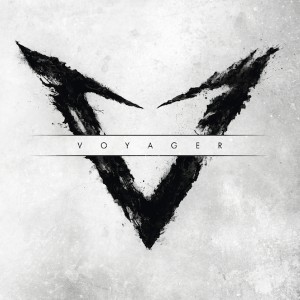 Australia’s Voyager has stealthily grown into one of my favorite bands over the past five years. While I was suitably impressed by 2009s I Am the Revolution, I was utterly blown away by 2011s The Meaning of I, to which I gave an extremely rare perfect score. They have a very distinctive sound and approach to power-prog and their ear for melody and hooks is second only to Anubis Gate. Naturally, as the release of V grew near I became giddy like a school girl at a Justin Bieber kissing booth. Now I’ve spent some serious time with V and it actually comes close to my high expectations…at first. This is really a tale of two albums: the first half is one slick, smooth, memorable song after another, but the second half drops way off, becoming far more pedestrian and unremarkable. V also sacrifices heaviness for more poppish melodies and their musical palette seems less diverse than before, but when it works, it works very well. Unfortunately, that’s only about 60% of the time here.
Australia’s Voyager has stealthily grown into one of my favorite bands over the past five years. While I was suitably impressed by 2009s I Am the Revolution, I was utterly blown away by 2011s The Meaning of I, to which I gave an extremely rare perfect score. They have a very distinctive sound and approach to power-prog and their ear for melody and hooks is second only to Anubis Gate. Naturally, as the release of V grew near I became giddy like a school girl at a Justin Bieber kissing booth. Now I’ve spent some serious time with V and it actually comes close to my high expectations…at first. This is really a tale of two albums: the first half is one slick, smooth, memorable song after another, but the second half drops way off, becoming far more pedestrian and unremarkable. V also sacrifices heaviness for more poppish melodies and their musical palette seems less diverse than before, but when it works, it works very well. Unfortunately, that’s only about 60% of the time here. The album is 54 minutes in length, but has about 36 minutes of prime, A-list material, and after the early run of great songs, the back-end really suffers by comparison. The inclusion of so many “B-Team” cuts really drags V down and instead of a short and awesome platter, we get a merely good one with chaff.
The album is 54 minutes in length, but has about 36 minutes of prime, A-list material, and after the early run of great songs, the back-end really suffers by comparison. The inclusion of so many “B-Team” cuts really drags V down and instead of a short and awesome platter, we get a merely good one with chaff.
 Our review of Fallujah‘s latest opus garnered attention recently. While other zines produced reviews that were like an unregulated experiment of the wanton fusion of two separate strains of exaggeration in praise of Unique Leader’s uniquest of leaders, headstrong
Our review of Fallujah‘s latest opus garnered attention recently. While other zines produced reviews that were like an unregulated experiment of the wanton fusion of two separate strains of exaggeration in praise of Unique Leader’s uniquest of leaders, headstrong 
 So why do we need a DR3 master? If the DR10 master is just as brutal, only with a wider spectrum and more dynamics even when the mix is geared for a loud mastering job, I’m not sure what the purpose of an overdriven master is. I’m left hoping, regardless, that the band and their label choose to release the DR10 master for fans that want it. The Flesh Prevails is a brutal tour de force of techy death metal and one of the better records I’ve heard this year. There’s no reason that I should hesitate to buy the CD because of the mastering job. For those interested in getting this mix, you can buy the vinyl (I will)—but that raises the question “why is it only people who buy vinyl who get better mastering jobs?” But I guess that’s a whole other can o’ worms, innit?
So why do we need a DR3 master? If the DR10 master is just as brutal, only with a wider spectrum and more dynamics even when the mix is geared for a loud mastering job, I’m not sure what the purpose of an overdriven master is. I’m left hoping, regardless, that the band and their label choose to release the DR10 master for fans that want it. The Flesh Prevails is a brutal tour de force of techy death metal and one of the better records I’ve heard this year. There’s no reason that I should hesitate to buy the CD because of the mastering job. For those interested in getting this mix, you can buy the vinyl (I will)—but that raises the question “why is it only people who buy vinyl who get better mastering jobs?” But I guess that’s a whole other can o’ worms, innit?


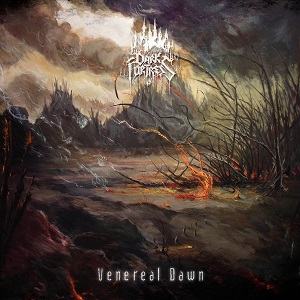 Concepts are tough nuts to crack, you’ve got to get your story across in roughly 7-10 tracks and at the same time the songs themselves need to stand alone and impress. Venereal Dawn
Concepts are tough nuts to crack, you’ve got to get your story across in roughly 7-10 tracks and at the same time the songs themselves need to stand alone and impress. Venereal Dawn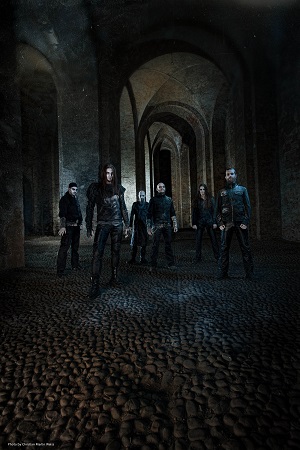 Dark Fortress run a tight ship and there’s no lack of precision and talent present in the band. Seraph (drums) also plays for prog metallers Noneuclid and symphonic band ReVamp and I suspect this is where his demanding drum contortions have grown and developed from. Asvargr and Santaura (Noneuclid and Tryptykon) handle the guitars and for the most part they continue with the technical guitar lines that were a part of Ylem. They’ve tried to bring in the heaviness that was lacking in the earlier release and they certainly hit closer to home with the integration of their dextrous, snaking guitar work into Seraph’s uncomfortable tempo shifts.
Dark Fortress run a tight ship and there’s no lack of precision and talent present in the band. Seraph (drums) also plays for prog metallers Noneuclid and symphonic band ReVamp and I suspect this is where his demanding drum contortions have grown and developed from. Asvargr and Santaura (Noneuclid and Tryptykon) handle the guitars and for the most part they continue with the technical guitar lines that were a part of Ylem. They’ve tried to bring in the heaviness that was lacking in the earlier release and they certainly hit closer to home with the integration of their dextrous, snaking guitar work into Seraph’s uncomfortable tempo shifts.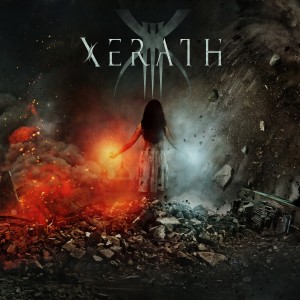 et’s face it: traditional symphonic metal is a playground of melodrama that’s nowhere near brutal enough. That’s why Fleshgod Apocalypse and Septicflesh (get mad about that concretion) are such popular bands – no matter how much we complain about their loud as hell albums here, there’s no denying that symphonic death is the perfect step forward for the maligned fusion genre. Recent experimenters in their wake are also making impressive strides for symphonic metal by combining it with the even more reviled genre of djent (get mad about that as well). Last year Ovid’s Withering (Flesh) put out a great album that we embarrassingly missed, and Xerath has been making djent-influenced symphonic music, also unnoticed by this site, since 2009. Xerath is quite the rarity, a band that’s truly one of a kind. Whether you like their ‘Strapping Young Lad writes a film score’ style or not, there’s certainly nobody out there quite like them, and III doesn’t bring them any closer to an archetype than their first two albums did. They still don’t give a shit about genre lines, seem unaware of conventions, and aren’t even remotely Greek.
et’s face it: traditional symphonic metal is a playground of melodrama that’s nowhere near brutal enough. That’s why Fleshgod Apocalypse and Septicflesh (get mad about that concretion) are such popular bands – no matter how much we complain about their loud as hell albums here, there’s no denying that symphonic death is the perfect step forward for the maligned fusion genre. Recent experimenters in their wake are also making impressive strides for symphonic metal by combining it with the even more reviled genre of djent (get mad about that as well). Last year Ovid’s Withering (Flesh) put out a great album that we embarrassingly missed, and Xerath has been making djent-influenced symphonic music, also unnoticed by this site, since 2009. Xerath is quite the rarity, a band that’s truly one of a kind. Whether you like their ‘Strapping Young Lad writes a film score’ style or not, there’s certainly nobody out there quite like them, and III doesn’t bring them any closer to an archetype than their first two albums did. They still don’t give a shit about genre lines, seem unaware of conventions, and aren’t even remotely Greek.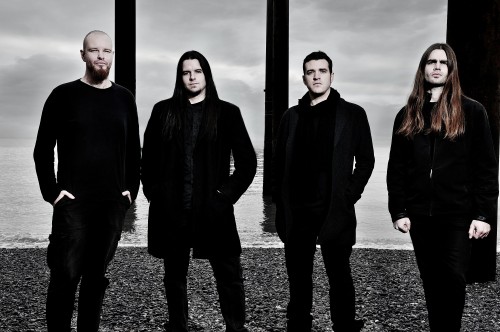
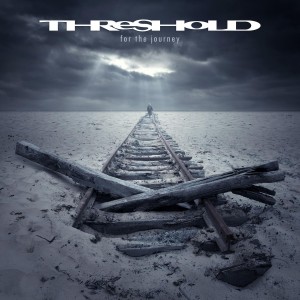 Threshold has long been a darling of the progressive metal scene for two very simple reasons: they’re unbelievably consistent and more importantly, they’re the anti-Dream Theater in that they remember how to write actual songs and not just seven minute, ego-driven wank fests that go nowhere. Despite the tragic death of long time singer Andrew “Mac” McDermott in 2011, the band bounced back hard with 2012’s
Threshold has long been a darling of the progressive metal scene for two very simple reasons: they’re unbelievably consistent and more importantly, they’re the anti-Dream Theater in that they remember how to write actual songs and not just seven minute, ego-driven wank fests that go nowhere. Despite the tragic death of long time singer Andrew “Mac” McDermott in 2011, the band bounced back hard with 2012’s 
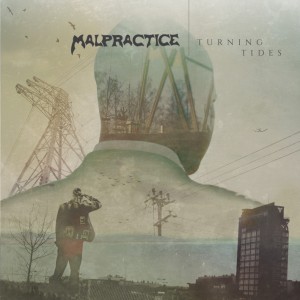 These days, prog metal seems to be coming down to how many strings your guitar has, if you’re a virtuoso or not, and what presets you have on your Axe-FX. Seriously, it seems like all the prog metal bands in the scene today have been obsessing over effect processors and compression during production, that it just drains the enjoyment out of it. Even then, they’re too busy wanking on their guitars, trying to constantly outperform everyone else who crosses their path. Essentially, to quote Devin Townsend, it’s a “dick swinging competition.”
These days, prog metal seems to be coming down to how many strings your guitar has, if you’re a virtuoso or not, and what presets you have on your Axe-FX. Seriously, it seems like all the prog metal bands in the scene today have been obsessing over effect processors and compression during production, that it just drains the enjoyment out of it. Even then, they’re too busy wanking on their guitars, trying to constantly outperform everyone else who crosses their path. Essentially, to quote Devin Townsend, it’s a “dick swinging competition.”
 Is there a better way to start a review of a metal album that with a brief discussion of semantics? Yes, there is, but I’m going to do just that anyway, written hooks be damned. Can anyone accurately define what “progressive” metal, or even “progressive” music, is? Is it letting everyone within earshot know that you listened to and enjoyed the entire discographies of King Crimson, Camel, and The Mahavishnu Orchestra? Is it mixing off-kilter riffs with huge, poppy hooks, modern-to-a-fault production, and good cop/bad cop vocals? Is it a shameless display of instrumental prowess? Is it Cynic? I have no idea, and I doubt many others do either. Point is, most things that don’t fit neatly into any genre box get thrown under the “progressive” umbrella, but are any of these countless bands truly pushing metal meaningfully forward? Probably not. Quartered, a “progressive” alt-metal band from Vancouver, are one such band guilty of this. But does that damn their anticipated new EP release, Eyes and Ears?
Is there a better way to start a review of a metal album that with a brief discussion of semantics? Yes, there is, but I’m going to do just that anyway, written hooks be damned. Can anyone accurately define what “progressive” metal, or even “progressive” music, is? Is it letting everyone within earshot know that you listened to and enjoyed the entire discographies of King Crimson, Camel, and The Mahavishnu Orchestra? Is it mixing off-kilter riffs with huge, poppy hooks, modern-to-a-fault production, and good cop/bad cop vocals? Is it a shameless display of instrumental prowess? Is it Cynic? I have no idea, and I doubt many others do either. Point is, most things that don’t fit neatly into any genre box get thrown under the “progressive” umbrella, but are any of these countless bands truly pushing metal meaningfully forward? Probably not. Quartered, a “progressive” alt-metal band from Vancouver, are one such band guilty of this. But does that damn their anticipated new EP release, Eyes and Ears?
 It’s easy to forget that at the time of it’s release, Ziltoid The Omniscient was something of a reboot for Devin Townsend‘s career. Having disbanded both his solo group and the long-running Strapping Young Lad in 2007, Townsend decided to return home, get healthy, and focus on family life. Ziltoid was his first release after that self-imposed exile. The record was charmingly low-budget, recorded solely by Townsend and a drum machine, and there was no tour to promote it.
It’s easy to forget that at the time of it’s release, Ziltoid The Omniscient was something of a reboot for Devin Townsend‘s career. Having disbanded both his solo group and the long-running Strapping Young Lad in 2007, Townsend decided to return home, get healthy, and focus on family life. Ziltoid was his first release after that self-imposed exile. The record was charmingly low-budget, recorded solely by Townsend and a drum machine, and there was no tour to promote it.
 I know embarrassingly little about the Russian metal scene, so the opportunity to review Tantal’s latest album was particularly… tantalizing. Formed in Pushkino in 2004, Tantal released their debut The Beginning of the End (is that really the best name for a first album?) in 2009. This flew completely under my radar, so I had no idea what to expect from Expectancy – a post-Soviet critique of the motivational theories of
I know embarrassingly little about the Russian metal scene, so the opportunity to review Tantal’s latest album was particularly… tantalizing. Formed in Pushkino in 2004, Tantal released their debut The Beginning of the End (is that really the best name for a first album?) in 2009. This flew completely under my radar, so I had no idea what to expect from Expectancy – a post-Soviet critique of the motivational theories of 
 Firstly, before I delve into the guts of this review, here’s a bit of context regarding the elaborate conceptual narrative San Francisco’s Giant Squid have once again crafted with their latest weird and wonderful musical trip, entitled Minoans. The Minoan civilization emerged on the island of Crete and thrived from roughly 2700 to 1450 BC. The civilization was rediscovered by British archaeologist Arthur Evans early in the twentieth century and has been referred to by American historian William Durant as “the first link in the European chain.” Singer/guitarist/artist Aaron Gregory, Giant Squid’s mastermind behind their epic lyrical concepts, further elaborates, “Lyrically, the album is a giant love letter to the Mediterranean and specifically Bronze-age Greece – a region, people and time period that deeply fascinates me and which I feel mirrors these heartbreakingly turbulent times we live in today.” I’m not here to give you a fucking history lesson, but for those seeking to get the full engagement of another carefully constructed and highly ambitious Giant Squid concept album, there’s an interesting backstory behind this mysterious civilization well worth investigating.
Firstly, before I delve into the guts of this review, here’s a bit of context regarding the elaborate conceptual narrative San Francisco’s Giant Squid have once again crafted with their latest weird and wonderful musical trip, entitled Minoans. The Minoan civilization emerged on the island of Crete and thrived from roughly 2700 to 1450 BC. The civilization was rediscovered by British archaeologist Arthur Evans early in the twentieth century and has been referred to by American historian William Durant as “the first link in the European chain.” Singer/guitarist/artist Aaron Gregory, Giant Squid’s mastermind behind their epic lyrical concepts, further elaborates, “Lyrically, the album is a giant love letter to the Mediterranean and specifically Bronze-age Greece – a region, people and time period that deeply fascinates me and which I feel mirrors these heartbreakingly turbulent times we live in today.” I’m not here to give you a fucking history lesson, but for those seeking to get the full engagement of another carefully constructed and highly ambitious Giant Squid concept album, there’s an interesting backstory behind this mysterious civilization well worth investigating.
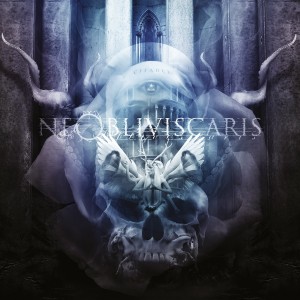 The Seasons of Mist promo team must have collectively flipped their titties when the Sydney Conservatorium of Music announced they were to use Ne Obliviscaris‘s “And Plague Flowers The Kaleido” on their teaching syllabus. In a world of increasingly simple and commercial music, nothing screams musical credibility more than appreciation from a prestigious classical school. Mutual respect and musical coalition of the ‘complex’ and ‘respectable’ genres of classical, jazz and metal are commonly used by bands and fans for self-validation and in intellectual dick-waving contests. The one complaint I had about Ne Obliviscaris‘s début LP,
The Seasons of Mist promo team must have collectively flipped their titties when the Sydney Conservatorium of Music announced they were to use Ne Obliviscaris‘s “And Plague Flowers The Kaleido” on their teaching syllabus. In a world of increasingly simple and commercial music, nothing screams musical credibility more than appreciation from a prestigious classical school. Mutual respect and musical coalition of the ‘complex’ and ‘respectable’ genres of classical, jazz and metal are commonly used by bands and fans for self-validation and in intellectual dick-waving contests. The one complaint I had about Ne Obliviscaris‘s début LP,  It’s not easy to pigeon-hole No Obliviscaris into a single extreme genre. While Portal Of I could be broadly categorized as symphonic black metal, Citadel bears stronger death influences. Compare the intros of “Tapestry Of The Starless Abstract” with “Pyrrhic”: the latter from Citadel bears further down-tuned guitars, a thicker bass drum, and tasty chromatic chord progressions, whereas the former has a more typical tremolo-picked black metal melody. The extreme metal sections here are absolutely punishing, such as on the opening five minutes of “Pyrrhic” and “Devour Me, Colossus I: Blackholes.” The battering blast beats, and the thick, technical riffs, contribute to this effect.
It’s not easy to pigeon-hole No Obliviscaris into a single extreme genre. While Portal Of I could be broadly categorized as symphonic black metal, Citadel bears stronger death influences. Compare the intros of “Tapestry Of The Starless Abstract” with “Pyrrhic”: the latter from Citadel bears further down-tuned guitars, a thicker bass drum, and tasty chromatic chord progressions, whereas the former has a more typical tremolo-picked black metal melody. The extreme metal sections here are absolutely punishing, such as on the opening five minutes of “Pyrrhic” and “Devour Me, Colossus I: Blackholes.” The battering blast beats, and the thick, technical riffs, contribute to this effect.
 Twenty-two years in the making, Manimalism is finally releasing their self-titled début. Fittingly, despite the obviously excellent instrumentation, it took a few listens before I started to actually enjoy the record. Now, I’ve reached the point where I think this aural demonstration of the Kim Sølve’s twisted imagination is as clever as it is disturbing. Originating as Taarenes Vaar in 1992 on a very different metal landscape, Sølve resolved to push his brand of Norwegian black metal further than previously. Composed of two demos from 1996 and 1997, plus additional material from the same period, the integration of black metal with avant garde here is raw and darkly perverse. Though not extreme in the same way as Mayhem or Thorns, the complex musical interplay, dissonant soundscape and crooned vocals contribute to an unsettling listening experience. While not perfect, I’ve been spinning it with maniacal glee.
Twenty-two years in the making, Manimalism is finally releasing their self-titled début. Fittingly, despite the obviously excellent instrumentation, it took a few listens before I started to actually enjoy the record. Now, I’ve reached the point where I think this aural demonstration of the Kim Sølve’s twisted imagination is as clever as it is disturbing. Originating as Taarenes Vaar in 1992 on a very different metal landscape, Sølve resolved to push his brand of Norwegian black metal further than previously. Composed of two demos from 1996 and 1997, plus additional material from the same period, the integration of black metal with avant garde here is raw and darkly perverse. Though not extreme in the same way as Mayhem or Thorns, the complex musical interplay, dissonant soundscape and crooned vocals contribute to an unsettling listening experience. While not perfect, I’ve been spinning it with maniacal glee. In this lies the greatest flaw of the fascinating music: you need to be a very active listener to get everything from this record. Only when paying attention can you fully appreciate the dark intricacies and subtle instrumentation. This is not a background record, and virtually requires explicit contemplation. Many people listen to music while otherwise occupied, and this record can wash by without leaving a mark on those with divided attention. This is arguably true of much music, but it says something that I noticed it particularly for Manimalism. Additionally, as the maelstrom builds around you towards the end of “The Gentleman Is In The Detail” and in “The Crooner,” the music calls for a blackened croak or shriek, but Manimalism resolutely only uses clean vocals. The self-important and grandiose style largely fits the decadence, but does not do justice to the full extent of the complex music. The twisted soundscape would benefit from sparingly-used extreme vocals in my opinion.
In this lies the greatest flaw of the fascinating music: you need to be a very active listener to get everything from this record. Only when paying attention can you fully appreciate the dark intricacies and subtle instrumentation. This is not a background record, and virtually requires explicit contemplation. Many people listen to music while otherwise occupied, and this record can wash by without leaving a mark on those with divided attention. This is arguably true of much music, but it says something that I noticed it particularly for Manimalism. Additionally, as the maelstrom builds around you towards the end of “The Gentleman Is In The Detail” and in “The Crooner,” the music calls for a blackened croak or shriek, but Manimalism resolutely only uses clean vocals. The self-important and grandiose style largely fits the decadence, but does not do justice to the full extent of the complex music. The twisted soundscape would benefit from sparingly-used extreme vocals in my opinion. Here’s a free top tip for all you kids looking to break into the music business: name your band something easily googleable. Distance have been kicking around for almost ten years now – forming in 2005, releasing a demo in 2006 and several singles at the end of the last decade – but presumably escaped any significant interest because no-one could bloody find them. Someone at Mighty Music eventually stumbled upon the right combination of search terms, though, and now Distance are finally releasing their debut album, the mundanely titled I. Such imaginative naming did not inspire confidence, but you know, books and covers and all that.
Here’s a free top tip for all you kids looking to break into the music business: name your band something easily googleable. Distance have been kicking around for almost ten years now – forming in 2005, releasing a demo in 2006 and several singles at the end of the last decade – but presumably escaped any significant interest because no-one could bloody find them. Someone at Mighty Music eventually stumbled upon the right combination of search terms, though, and now Distance are finally releasing their debut album, the mundanely titled I. Such imaginative naming did not inspire confidence, but you know, books and covers and all that.
 If you’re anything like me, you’re super awesome. But more to the point, you would have been saddened by the split of blackened death metal troublemakers Akercocke a couple of years ago. Perhaps the UK’s most consistently entertaining extreme metal act of the last decade, they seemed to improve on every album, reaching a pinnacle on 2007’s Antichrist. “Best to give up while you’re ahead” you might think, but I suspected they would have improved still further if they’d released anything more. Voices are the band that rose from Akercocke’s ashes
If you’re anything like me, you’re super awesome. But more to the point, you would have been saddened by the split of blackened death metal troublemakers Akercocke a couple of years ago. Perhaps the UK’s most consistently entertaining extreme metal act of the last decade, they seemed to improve on every album, reaching a pinnacle on 2007’s Antichrist. “Best to give up while you’re ahead” you might think, but I suspected they would have improved still further if they’d released anything more. Voices are the band that rose from Akercocke’s ashes
 Sphere fetishists of the world rejoice! We now present to you a band that not only has “sphere” in the moniker, but also offers a song called “The Sphere.” And yes, there’s a goddamn sphere on the cover too. Are you not entertained?! Ok, now that the sphere furbies left, we can get on with the review of what is a shockingly good album. Triosphere is a progressive power metal act hailing from Norway and though AMG and myself enjoyed their 2010 effort
Sphere fetishists of the world rejoice! We now present to you a band that not only has “sphere” in the moniker, but also offers a song called “The Sphere.” And yes, there’s a goddamn sphere on the cover too. Are you not entertained?! Ok, now that the sphere furbies left, we can get on with the review of what is a shockingly good album. Triosphere is a progressive power metal act hailing from Norway and though AMG and myself enjoyed their 2010 effort 
 Metal has been extremely retro in the last 5 years. From rethrash to retro death metal, the whole scene has crawled into its proverbial ass in order to wallow in the digested remnants of metal music that is just plain better. Rethrash celebrates the 2.5 years when thrash was the heaviest and most exciting music on the planet. Retro death celebrates a time when bands would scrape together their last Swedish kronor to put a record together that would still sound like total shit. All the bands who wish they were Black Sabbath celebrate a time when amplifiers didn’t actually have overdrive. But all of these celebrated sounds appeal to us because they were authentic: times when newness and creativity gave the world something exciting and special. One such scene for me is the melodic death and black metal scenes of the Scandinavian 1990s. It’s an era when metal was heavy, engaging, abstract, and yet melodic—it felt exciting and new. While not all of the best ideas from this era were executed perfectly at the time, it laid the groundwork for the late ’90s and the early aughts when great metal bands produced great music.
Metal has been extremely retro in the last 5 years. From rethrash to retro death metal, the whole scene has crawled into its proverbial ass in order to wallow in the digested remnants of metal music that is just plain better. Rethrash celebrates the 2.5 years when thrash was the heaviest and most exciting music on the planet. Retro death celebrates a time when bands would scrape together their last Swedish kronor to put a record together that would still sound like total shit. All the bands who wish they were Black Sabbath celebrate a time when amplifiers didn’t actually have overdrive. But all of these celebrated sounds appeal to us because they were authentic: times when newness and creativity gave the world something exciting and special. One such scene for me is the melodic death and black metal scenes of the Scandinavian 1990s. It’s an era when metal was heavy, engaging, abstract, and yet melodic—it felt exciting and new. While not all of the best ideas from this era were executed perfectly at the time, it laid the groundwork for the late ’90s and the early aughts when great metal bands produced great music.
 Here at Angry Metal Guy US headquarters, subtle signs point to 2014 drawing to a blustery close. My very metal cats watch the crackling fireplace, mesmerized as the world burns at their paws. Top 10 lists hastily scrawled on the backs of store receipts and the margins of the daily paper are pulled from coat pockets and tossed carelessly about, littering every surface. And as the holiday silly season approaches, I’m winding down, bourbon in hand, returning to the contemplative atmosphere of post-metal and avant guard favourites like Agalloch, A Forest of Stars, Anathema, Horseback and New Keepers of the Watertowers. Now a year and some change after the release of Dustwalker, British progressive black metallers – Fen recapture my attention with their fourth full-length release. And those of you that read my review of
Here at Angry Metal Guy US headquarters, subtle signs point to 2014 drawing to a blustery close. My very metal cats watch the crackling fireplace, mesmerized as the world burns at their paws. Top 10 lists hastily scrawled on the backs of store receipts and the margins of the daily paper are pulled from coat pockets and tossed carelessly about, littering every surface. And as the holiday silly season approaches, I’m winding down, bourbon in hand, returning to the contemplative atmosphere of post-metal and avant guard favourites like Agalloch, A Forest of Stars, Anathema, Horseback and New Keepers of the Watertowers. Now a year and some change after the release of Dustwalker, British progressive black metallers – Fen recapture my attention with their fourth full-length release. And those of you that read my review of 
 I was quite intrigued when I grabbed the promo for Resumed’s debut album Alienations for two reasons: they’re technical death metal and they’re Italian. However, when I hit the play button expecting to find some spaghetti-flavored Origin (or something equivalent), I instead found the other kind of tech death. You know, the kind linked to words like “jazz,” “fusion,” “funk,” and “virtuoso playing.” Admittedly, this style of technical death is not my favorite, but it turns out Resumed can shred virtuously. Not the best song writing in the world but the musicianship of each member is astounding. Let the wanking begin!
I was quite intrigued when I grabbed the promo for Resumed’s debut album Alienations for two reasons: they’re technical death metal and they’re Italian. However, when I hit the play button expecting to find some spaghetti-flavored Origin (or something equivalent), I instead found the other kind of tech death. You know, the kind linked to words like “jazz,” “fusion,” “funk,” and “virtuoso playing.” Admittedly, this style of technical death is not my favorite, but it turns out Resumed can shred virtuously. Not the best song writing in the world but the musicianship of each member is astounding. Let the wanking begin!
 Let’s get this out of the way right now: Resumed are talented musicians. Carlo Pelino and Daniele Presutti’s guitars shred all over the place, Filippo Tirabassi’s drums are tight and precise to a fault, and Giulia Pallozzi’s bass playing is, from a technical standpoint, excellent. They also really enjoyed the two final Death albums, and decided to write the eight songs that comprise Alienations in that vein. Unfortunately, they’re not nearly as adept at writing Death songs as Death was (an understandable fault), and the 41 minutes of metal here all whiz by with nothing at all memorable to encourage repeat listening.
Let’s get this out of the way right now: Resumed are talented musicians. Carlo Pelino and Daniele Presutti’s guitars shred all over the place, Filippo Tirabassi’s drums are tight and precise to a fault, and Giulia Pallozzi’s bass playing is, from a technical standpoint, excellent. They also really enjoyed the two final Death albums, and decided to write the eight songs that comprise Alienations in that vein. Unfortunately, they’re not nearly as adept at writing Death songs as Death was (an understandable fault), and the 41 minutes of metal here all whiz by with nothing at all memorable to encourage repeat listening. While Resumed play unmemorable tech-death for 41 minutes, at least they sound great doing it. The production by Tirabassi is well-rounded and sports an excellent mastering job, with each instrument being audible and clear and no clipping whatsoever. Guitars are precise and tight, if a tad airy in sound, and Pallozzi’s bass has a tasty, ever-so-slightly overdriven tone that punches through the mix, showcasing her skill wonderfully. Tirabassi’s drum work is a treat to listen to, with each and every note coming through clearly. Special mention should be made of his kick drum, which occupies the happy middle between click and thud, avoiding the dreaded “typewriter kick” that too often plagues modern death metal. Vocals, on the other hand, are a bit too high in the mix, which serves to amplify their fatal flaw: they’re boring. It’s impressive that Presutti is playing guitar while growling, but his vocal patterns seem tacked on and his growl is monotonous, lacking in power and intensity. The vocals seem to be there for the sole reason that metal songs tend to have vocals most of the time, and as such, end up adding a boring percussive element to Resumed’s otherwise blistering technical attack.
While Resumed play unmemorable tech-death for 41 minutes, at least they sound great doing it. The production by Tirabassi is well-rounded and sports an excellent mastering job, with each instrument being audible and clear and no clipping whatsoever. Guitars are precise and tight, if a tad airy in sound, and Pallozzi’s bass has a tasty, ever-so-slightly overdriven tone that punches through the mix, showcasing her skill wonderfully. Tirabassi’s drum work is a treat to listen to, with each and every note coming through clearly. Special mention should be made of his kick drum, which occupies the happy middle between click and thud, avoiding the dreaded “typewriter kick” that too often plagues modern death metal. Vocals, on the other hand, are a bit too high in the mix, which serves to amplify their fatal flaw: they’re boring. It’s impressive that Presutti is playing guitar while growling, but his vocal patterns seem tacked on and his growl is monotonous, lacking in power and intensity. The vocals seem to be there for the sole reason that metal songs tend to have vocals most of the time, and as such, end up adding a boring percussive element to Resumed’s otherwise blistering technical attack. Archspire are, first and foremost, fast. Everything about The Lucid Collective is tight, taught and percussive, from the brutal-death-leaning snare tone to vocalist Oli Peters’ inhumanly pummeling rap-growled vocal lines. Guitarists Dean Lamb and Tobi Moreli execute hairpin curves in mid riff while the bass hammers along in support. These guys are no slouches, not by a long shot, but as always, technical ability is a prerequisite in this genre rather than a standout attribute. The Lucid Collective is worth your time because its performances rarely attempt to overshadow the core of wild riffing and adrenaline-soaked rhythm that’s at the center of the album.
Archspire are, first and foremost, fast. Everything about The Lucid Collective is tight, taught and percussive, from the brutal-death-leaning snare tone to vocalist Oli Peters’ inhumanly pummeling rap-growled vocal lines. Guitarists Dean Lamb and Tobi Moreli execute hairpin curves in mid riff while the bass hammers along in support. These guys are no slouches, not by a long shot, but as always, technical ability is a prerequisite in this genre rather than a standout attribute. The Lucid Collective is worth your time because its performances rarely attempt to overshadow the core of wild riffing and adrenaline-soaked rhythm that’s at the center of the album.